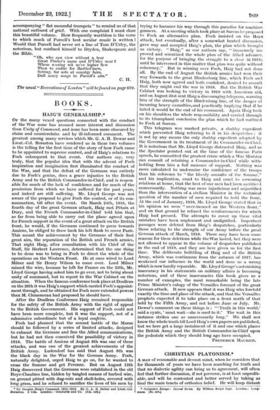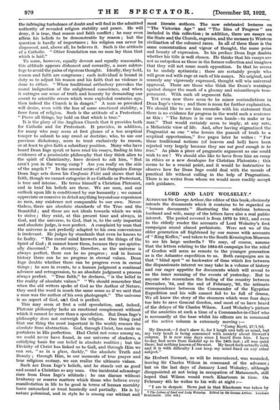CHRISTIAN PLATONISM.* A maw of reasonable and devout mind, when
he considers that for thousands of years we have been searching for truth and that no dialectic agility can bring us to agreement, will often feel that further discussion, if not perverse, is at least unprofit- able, and will be contented and better served by taking as final the main tenets of orthodox belief. He will keep distant
• Outspoken Essays: Second Seeks. By William Ralph Inge. London Long- mans. • les. net.)
the infringing turbulence of doubt and will find in the admitted authority of revealed religion stability and peace. He will deny, it is true, that reason and faith conflict ; he may even affirm his beliefs to be demonstrable by reason ; but the question is hardly of importance ; his religion can never be disproved, and, above all, he believes it. Such is the attitude of a Catholic. " Other foundation can no man lay than that which is laid."
To some, however, equally devout and equally reasonable, this attitude appears dishonest and cowardly, a mere subter- fuge to avoid the pains of rigorous thought. Ideally, they hold, reason and faith are congruous ; each individual is bound in duty so to adjust his reason and his faith that no violence is done to either. " When traditional orthodoxy provokes the moral indignation of the enlightened conscience, and when it outrages our sense of truth and honesty by demanding our assent to scientific errors which were exploded centuries ago, then indeed the Church is in danger." A man so provoked will desire, even with the loss of some emotional stability, a freer form of religion. Such is the attitude of a Protestant. " Prove all things, lay hold on that which is true."
It is the glory of the Anglican Church that it provides both for Catholic and for Protestant. It provides, in addition, for many who may seem at first glance of a too sceptical temper to submit to any creed or doctrine, who, to use our previous dichotomy, seem to trust exclusively to reason, or at least to give faith a subsidiary position. Many who have heard Dean Inge speak or have read his essays, finding in him evidences of a pessimistic philosophy that they think alien to the spirit of Christianity, have desired to ask him, " But aren't you in the wrong camp ? Are you really on the side of the angels ? " In the second series of his Outspoken Essays Dean Inge sets down his Confessio Fidei and shows that his faith, though we cannot categorize it as Catholic or Protestant, is true and intense. He terms himself a Christian Platonist, and in brief his beliefs are these. We are men, and our outlook upon life is conditioned by our humanity ; we cannot appreciate or conceive in detail anything beyond our experience as men, any existence not comparable to our own. Never- theless, there are absolute standards of the True and the Beautiful ; and these are not ideals towards which we wish to strive ; they exist, at this present time and always, in God, and the universe, to God, that is, to the only impartial and absolute judge, is now perfect. A complaint by man that the universe is not perfectly adapted to his own convenience is irrelevant. He judges by standards that even he knows to be faulty. " The carnal mind knoweth not the things of the Spirit of God ; it cannot know them, because they are spiritu- ally discerned." In eternity, therefore, as the universe is always perfect, there can be no progress ; and in human history there can be no progress in eternal values. Dean Inge doubts whether there can be progress even in carnal things ; he sees in events, to a human judgment a continual advance and retrogression, to an absolute judgment a process always perfect. "True faith," he declares, " is the belief in the reality of absolute values." " We should remember that when the old writers spoke of God as the Author of Nature, they used the word in much the same sense as if we said that a man was the author of his own photograph." The universe is an aspect of God, and God is perfect.
This may seem at first a cold speculation, and, indeed, Platonic philosophy lacks an emotional complement without which it cannot be more than a speculation. But Dean Inge's philosophy does not outweigh his religion. One thing (and that one thing the most important in the world) rescues the absolute from abstraction. God, through Christ, has made us partakers in His perfection. Had Christ not come among us, we could never have found, in our universe of shadows, a satisfying basis for our belief in absolute realities ; but the Divinity of Christ has linked us to Goa, and through Rim we can see, " as in a glass, darkly," the absolute Truth and Beauty ; through Him, in our moments of true prayer and true religious ecstasy, we can realize the ultimate values.
Such are Dean Inge's beliefs, and he stands out as good and sound a Christian as any man. One incidental advantage rises from Dean Inge's attitude : he can discuss without hesitancy or reserve matters which those who believe every manifestation in life to be good in terms of human morality leave untouched or treat hurriedly and partially. He is by nature polemical, and in style he is among our wittiest and
most literate authors.. The now celebrated lectures on "The Victorian Age" and "The Idea of Progress " are included in this collection ; in addition, there are essays on
the State and the Church,. eugenics, and the menaceto Westerncivilization of the coloured races. In all of these there is the
same concentration and vigour of thought, the same poise and beauty of expression. In his preface Dean Inge doubts. whether his title is well chosen. He thinks that his essays are not as outspoken as those in the former collection and imagines that they will not rouse much opposition. In that he seems to be unduly optimistic ; there are certainly people who will grow red with rage at each of his essays. No original, and scarcely any vigorously expressed, thought will win universal approval. There are those who think the Dean's warnings against danger the mark of a gloomy and misanthropic tem- perament. With such all argument fails.
Yet even now there seem -to be minor contradictions in Dean Inge's views ; and there is room for further explanation. We should like to see him reconcile with his statement that there is no evidence for progress in the world such a sentence as this : " The future is in our own hands—to make or to mar." That would certainly seem to imply, at any rate, a Melioristic view of life. And, after having stigmatized the Pragmatist as one " who lowers the pursuit of truth to a sceptical opportunism," five pages later he writes : " For these traditional notions (of heaven and hell) have been rejected very largely because they are not good enough to be true." As plain a piece of pragmatic argument as one could wish to see ! We should also like to have from him an essay in ethics or a new decalogue for Christian Platonists ; this seems to be a crucial point, and it would be instructive to observe how far Dean Inge could deal with the morals of practical life without calling in the help of Pragmatism. There is no writer from whom we would more readily accept such guidance











































 Previous page
Previous page